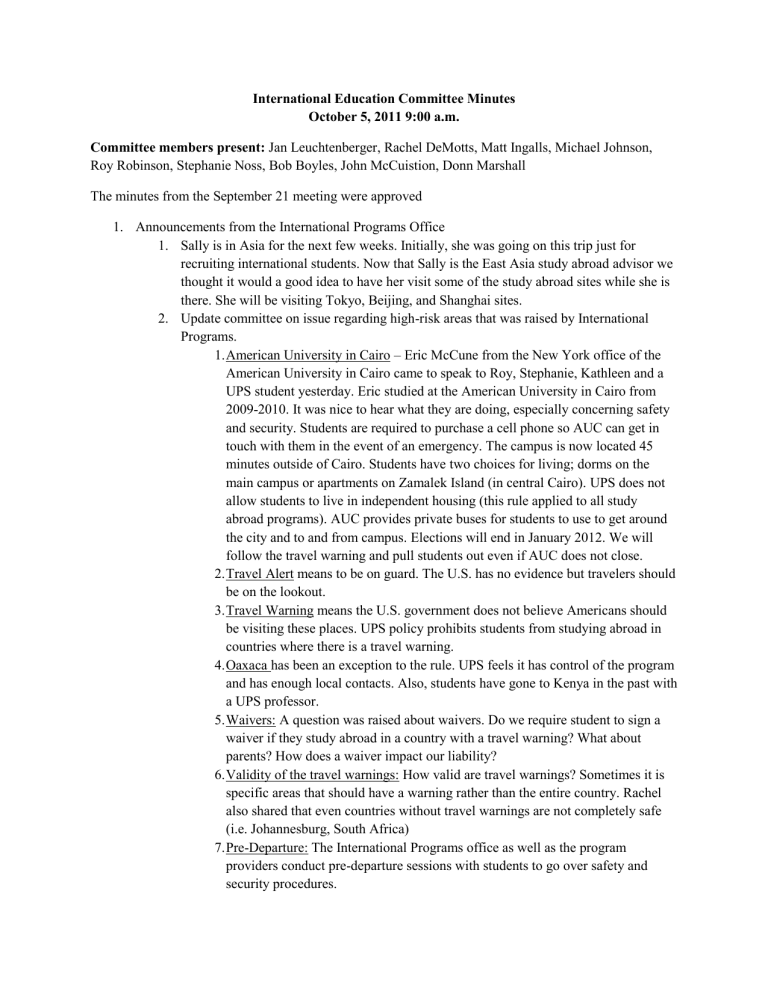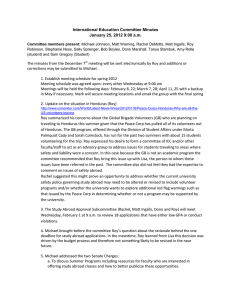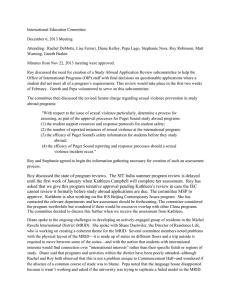International Education Committee Minutes October 5, 2011 9:00 a.m. Committee members present:

International Education Committee Minutes
October 5, 2011 9:00 a.m.
Committee members present: Jan Leuchtenberger, Rachel DeMotts, Matt Ingalls, Michael Johnson,
Roy Robinson, Stephanie Noss, Bob Boyles, John McCuistion, Donn Marshall
The minutes from the September 21 meeting were approved
1.
Announcements from the International Programs Office
1.
Sally is in Asia for the next few weeks. Initially, she was going on this trip just for recruiting international students. Now that Sally is the East Asia study abroad advisor we thought it would a good idea to have her visit some of the study abroad sites while she is there. She will be visiting Tokyo, Beijing, and Shanghai sites.
2.
Update committee on issue regarding high-risk areas that was raised by International
Programs.
1.
American University in Cairo – Eric McCune from the New York office of the
American University in Cairo came to speak to Roy, Stephanie, Kathleen and a
UPS student yesterday. Eric studied at the American University in Cairo from
2009-2010. It was nice to hear what they are doing, especially concerning safety and security. Students are required to purchase a cell phone so AUC can get in touch with them in the event of an emergency. The campus is now located 45 minutes outside of Cairo. Students have two choices for living; dorms on the main campus or apartments on Zamalek Island (in central Cairo). UPS does not allow students to live in independent housing (this rule applied to all study abroad programs). AUC provides private buses for students to use to get around the city and to and from campus. Elections will end in January 2012. We will follow the travel warning and pull students out even if AUC does not close.
2.
Travel Alert means to be on guard. The U.S. has no evidence but travelers should be on the lookout.
3.
Travel Warning means the U.S. government does not believe Americans should be visiting these places. UPS policy prohibits students from studying abroad in countries where there is a travel warning.
4.
Oaxaca has been an exception to the rule. UPS feels it has control of the program and has enough local contacts. Also, students have gone to Kenya in the past with a UPS professor.
5.
Waivers: A question was raised about waivers. Do we require student to sign a waiver if they study abroad in a country with a travel warning? What about parents? How does a waiver impact our liability?
6.
Validity of the travel warnings: How valid are travel warnings? Sometimes it is specific areas that should have a warning rather than the entire country. Rachel also shared that even countries without travel warnings are not completely safe
(i.e. Johannesburg, South Africa)
7.
Pre-Departure: The International Programs office as well as the program providers conduct pre-departure sessions with students to go over safety and security procedures.
8.
Travel Abroad Policy for High-Risk Areas: Roy brought in this document to share with the committee. Questions were raised about who approved this document. Jan would look into this issue further.
3.
Update on Charge G (designing survey of students to assess impact of financial aid changes)
1.
Jan said it was worth waiting to see the new data before designing an assessment tool. It may not be as pressing as it seems. Jan also brought up that this is a charge from the administration but rather the committee itself.
2.
Roy said he has seen a mix between the students that have been positively and negatively
3.
Before retiring, Jan Moore said she did think any students decided not to study abroad because of the policy. Committee members wondered if students just selfselected not to go and it was possible that Jan Moore did not know about those students.
4.
A question was raised about selecting students for programs to help balance out the budget. Roy shared that Willamette uses this system to keep their budget in balance. Michael said students are accepted in February and the budget is made in May so he was unsure if this system would work. Perhaps, we could look into a 3 year window of a budget. A 10% deficit could be offset by a 10% surplus the next year.
1.
We are an advisory committee and we are not sure how much weight we would hold in carrying out this.
5.
Roy said ILACA was surprised that we do not let all merit aid go with students on study abroad.
4.
Petition to Add a Program
1.
IFSA-Butler Oxford
1.
Valid academic reason was there
2.
The program is unique in that we do not have any other tutorial programs in England.
3.
The committee voted to approve the program
2.
Going forward the committee will look for two things when deciding to add a program
1.
Valid academic reason
2.
The uniqueness of the program (location and academics)
3.
After the committee approves a program, Kathleen Campbell will look over the courses for approval and the International Programs office will vet the program for safety.
5.
Faculty-led study abroad programs
1.
Roy said there is a connection between faculty led programs and the budget.
2.
This topic will be tabled for the next meeting.
The meeting adjourned at 9:50 a.m.
Respectfully submitted, Stephanie Noss




